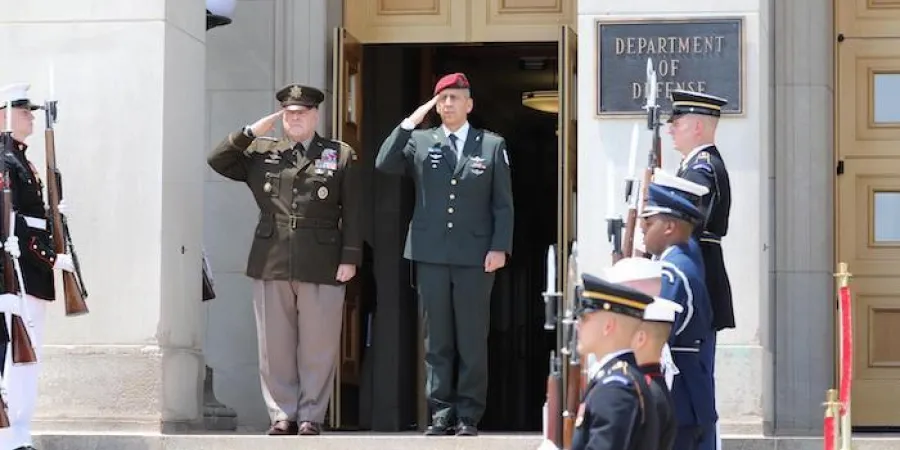Baptism of fire: Kochavi makes first visit to Pentagon
For the first time since assuming his post, the IDF chief of staff visits Washington. Do the Americans want to make sure that the IDF is not planning surprises in Iran?
Ami Rojkes Dombe
| 23/06/2021
The IDF Chief of Staff, Lieut. Gen. Aviv Kochavi, finished the first two working days of his visit to the U.S. He had a series of meetings in the Pentagon and participated in a ceremony at Arlington National Cemetery during which he placed a wreath at the Tomb of the Unknown Soldier.
The chief of staff was welcomed at the Pentagon by an honor guard and the chairman of the Joint Chiefs of Staff, four-star Gen. Mark A. Milley, and afterwards met with Secretary of Defense Lloyd Austin. The meetings included a panel led by the chairman of the Joint Chiefs of Staff and other senior officers from the IDF and the U.S. military, as well as a series of intelligence and operational briefings.
The participants discussed issues related to common challenges of the militaries of the U.S. and Israel, first and foremost the Iranian nuclear threat and Iranian entrenchment around the Middle East. The chief of staff explained the failures of the nuclear agreement that have enabled Iran in the years since then to make significant progress in the amount and quality of centrifuges and in the amount and quality of enriched material, emphasizing the lack of supervision of the development of nuclear weapons.
The chief of staff stressed the inherent danger in returning to the original agreement and emphasized that everything possible should be done to prevent Iran from acquiring military nuclear capabilities. Issues related to Hezbollah's acquisition of weapons systems and precision missiles as well as the challenges and responses in the Palestinian domain, especially the Gaza Strip, were also discussed at the meetings.
In addition, the chief of staff explained to his hosts the operational performance, unique operational methods and achievements in operation "Guardian of the Walls". Following the meetings, the chief of staff said "the strategic and military alliance with the U.S. serves as a most significant element of the national security of the State of Israel. Cooperation between the militaries is a force multiplier and mutual interest that has tightened in recent years, and we will continue to work together against common threats in the Middle East."
For the first time since assuming his post, the IDF chief of staff visits Washington. Do the Americans want to make sure that the IDF is not planning surprises in Iran?
The IDF Chief of Staff, Lieut. Gen. Aviv Kochavi, finished the first two working days of his visit to the U.S. He had a series of meetings in the Pentagon and participated in a ceremony at Arlington National Cemetery during which he placed a wreath at the Tomb of the Unknown Soldier.
The chief of staff was welcomed at the Pentagon by an honor guard and the chairman of the Joint Chiefs of Staff, four-star Gen. Mark A. Milley, and afterwards met with Secretary of Defense Lloyd Austin. The meetings included a panel led by the chairman of the Joint Chiefs of Staff and other senior officers from the IDF and the U.S. military, as well as a series of intelligence and operational briefings.
The participants discussed issues related to common challenges of the militaries of the U.S. and Israel, first and foremost the Iranian nuclear threat and Iranian entrenchment around the Middle East. The chief of staff explained the failures of the nuclear agreement that have enabled Iran in the years since then to make significant progress in the amount and quality of centrifuges and in the amount and quality of enriched material, emphasizing the lack of supervision of the development of nuclear weapons.
The chief of staff stressed the inherent danger in returning to the original agreement and emphasized that everything possible should be done to prevent Iran from acquiring military nuclear capabilities. Issues related to Hezbollah's acquisition of weapons systems and precision missiles as well as the challenges and responses in the Palestinian domain, especially the Gaza Strip, were also discussed at the meetings.
In addition, the chief of staff explained to his hosts the operational performance, unique operational methods and achievements in operation "Guardian of the Walls". Following the meetings, the chief of staff said "the strategic and military alliance with the U.S. serves as a most significant element of the national security of the State of Israel. Cooperation between the militaries is a force multiplier and mutual interest that has tightened in recent years, and we will continue to work together against common threats in the Middle East."



